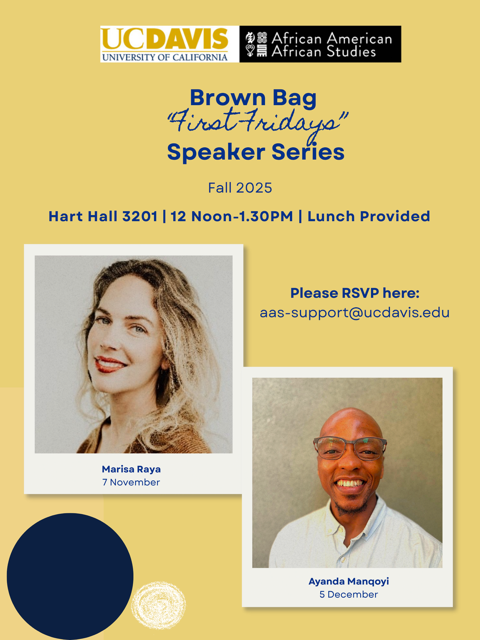
The first Brown Bag Speaker Series event will feature Marisa Raya. Join us for a great presentation, conversation, and food! See more details below.
Please RSVP by emailing: aas-support@ucdavis.edu or filling out this form.
Friday, November 7th
12:00pm-1:30pm
Hart 3201
Title: Creating the Reparative State: Narrating Black Geographies in California Policymaking
Abstract: How do public equity and reparations goals become land access policies and outcomes? California has had three statewide reparations, healing, and equity processes to build political consensus on the relationship between diverse Californians, the State, and our lands. In California’s Reparations Task Force (2020-2023) and Truth and Healing Council (2020-ongoing), thousands of Black and Native Californians testified on their land relations, desired healing, and reparative goals around food systems, land access, and rural governance. The California Agricultural Land Equity Task Force (2024-2025) has suggested further repairs for land relations and food systems. Black Geographies and Black Ecology help tell these stories through theories of erasure, harm, political organizing, cooperative business development, and Black American agriculture as an extension of African knowledge production and spirit (Bandele and Myers 2016). Public testimonies and State recognition help policymakers and the public understand the social construction of space and place in rural California. They provide essential direction for changes to land governance, planning, and investment to affirm the descendants of enslaved African Americans in a multiracial context. California has the opportunity to advance a model for equitable rural community development rooted in restoring land relationships and access.
Bio: Marisa spent 15 years leading economic equity strategy in local and regional government and is an advisor to California’s Agricultural Land Equity Task Force. She is concluding her Geography PhD at UC Davis with DEs in both African and African American and Native American Studies. She has an international Masters in Spatial Planning from Küngliga Tekniska Högskolan and has spent 10 years teaching and revising an original planning course at Stanford University. She connects publicly-articulated equity and reparative goals to land use policies, infrastructure and conservation funding.
Our second Brown Bag Speaker Series event features Ayanda Manqoyi. Join us to hear a great presentation, have conversation, and enjoy some food! See more details below.
Please RSVP by emailing: aas-support@ucdavis.edu or filling out this form.
Friday December 5th
12:00pm-1:30pm
Hart 3201
Title: "Expersonation" of town and rural: access of entrepreneurial cultures in Lusikisiki town, South Africa
Abstract: The comparison of urban life across Africa has prompted a closer examination of specific large cities in Africa. The paradox in focusing on major urban centers, such as Johannesburg (South Africa), is the exaggerated neglect of the networks, practices, and circulations of various bonds and attachments that develop between towns in the periphery and urban centers, as well as towns serving as centers in their own peripheries. Extensions between urban centers and peripheries can be understood as mimicking imaginary elements of each other as people and their lifeworlds move with or against them. This dynamic can slow down social processes, resulting in exaggerated details that shape social conventions. In this chapter, I employ Roy Wagner’s concept of ‘expersonation’-the outcome of mutual impersonation —to examine how small towns become areas of experimentation in networking, practices, beliefs, modernity, and capitalism. How these elements of experimentation facilitate anchoring to a place, and in turn, relate to their rural surroundings and beyond. Where uncertainty is constant, the process of expersonation becomes ligatures to anchor people, things, and ideas to a place. Lusikisiki, characterized as a “rutown,” increasingly showcases the nuances of built environments, spatial usage, and the development of vernacular entrepreneurial cultures.
Bio: Ayanda Manqoyi is a PhD candidate in the Social Anthropology Department at UC Davis. He is the recipient of the 2023 Wenner-Gren Fieldwork Research Fellowship. During his fieldwork in South Africa, he was affiliated with the University of Cape Town’s Institute for Humanities in Africa (HUMA). As a Mellon Mays Fellow, Ayanda served on the Planning Advisory Committee for the Mellon Mays Graduate Fellowship in 2019. In 2018, he participated in the Indian Ocean Worlds Research Initiative at UC Davis. Ayanda has presented at various conferences, including the CODESRIA General Assembly in Dakar, Senegal (2018), the SSRC Mellon Mays Graduate Summer Conference at Columbia University, New York (2018), and the European Conference on African Studies at the University of Basel, Switzerland (2017). He has published a chapter in two edited volumes: Citizenship in Motion (2019) and Eating and Being: Cannibalism as Food for Thought (2018). Additionally, he has collaborated on articles that appeared in the online Boston Review—“What Future for South African Democracy” (2016)—and in the Daily Maverick—“Looking for Leaders: Student Protests and the Future of South African Democracy” (2015).
